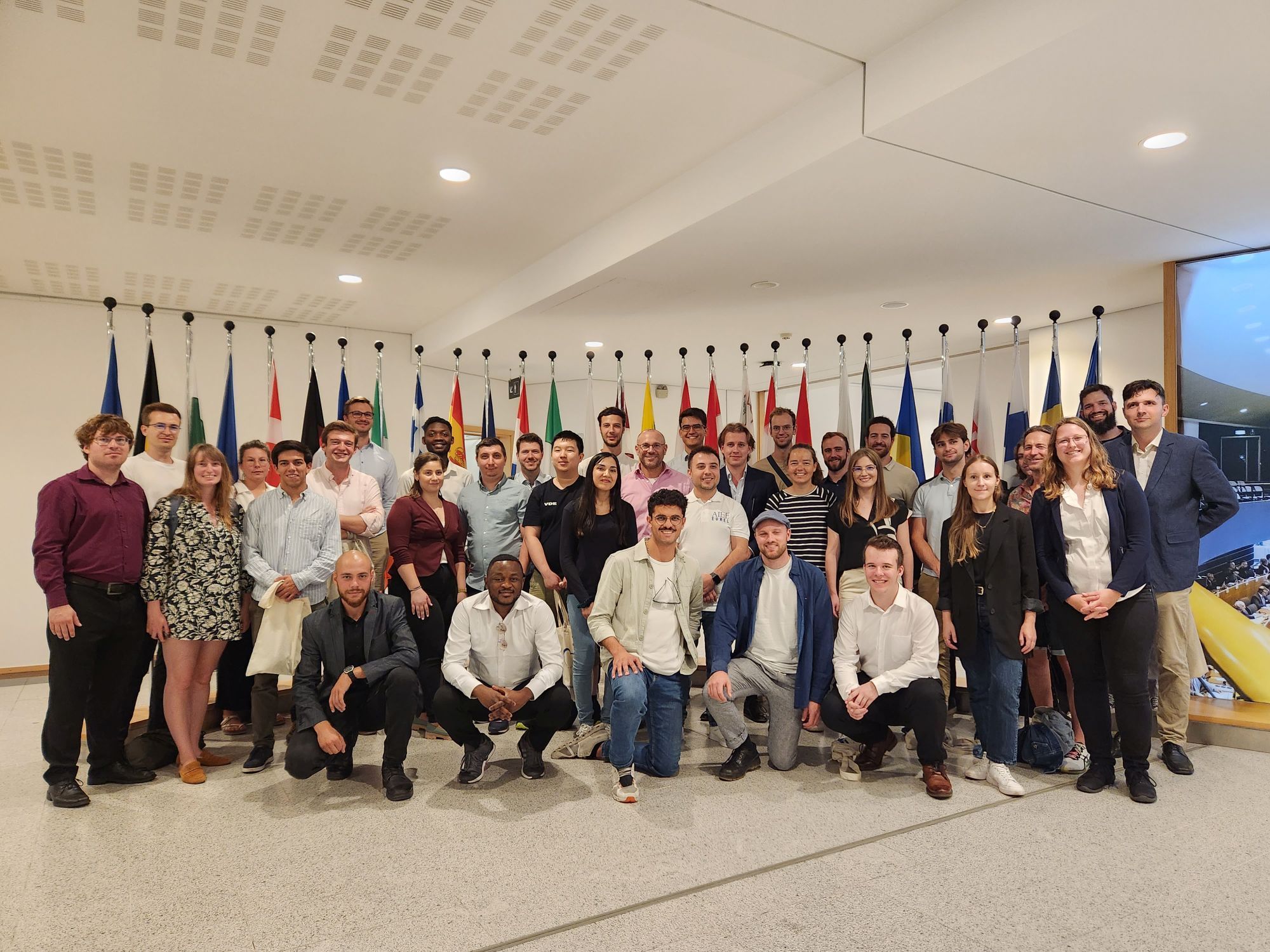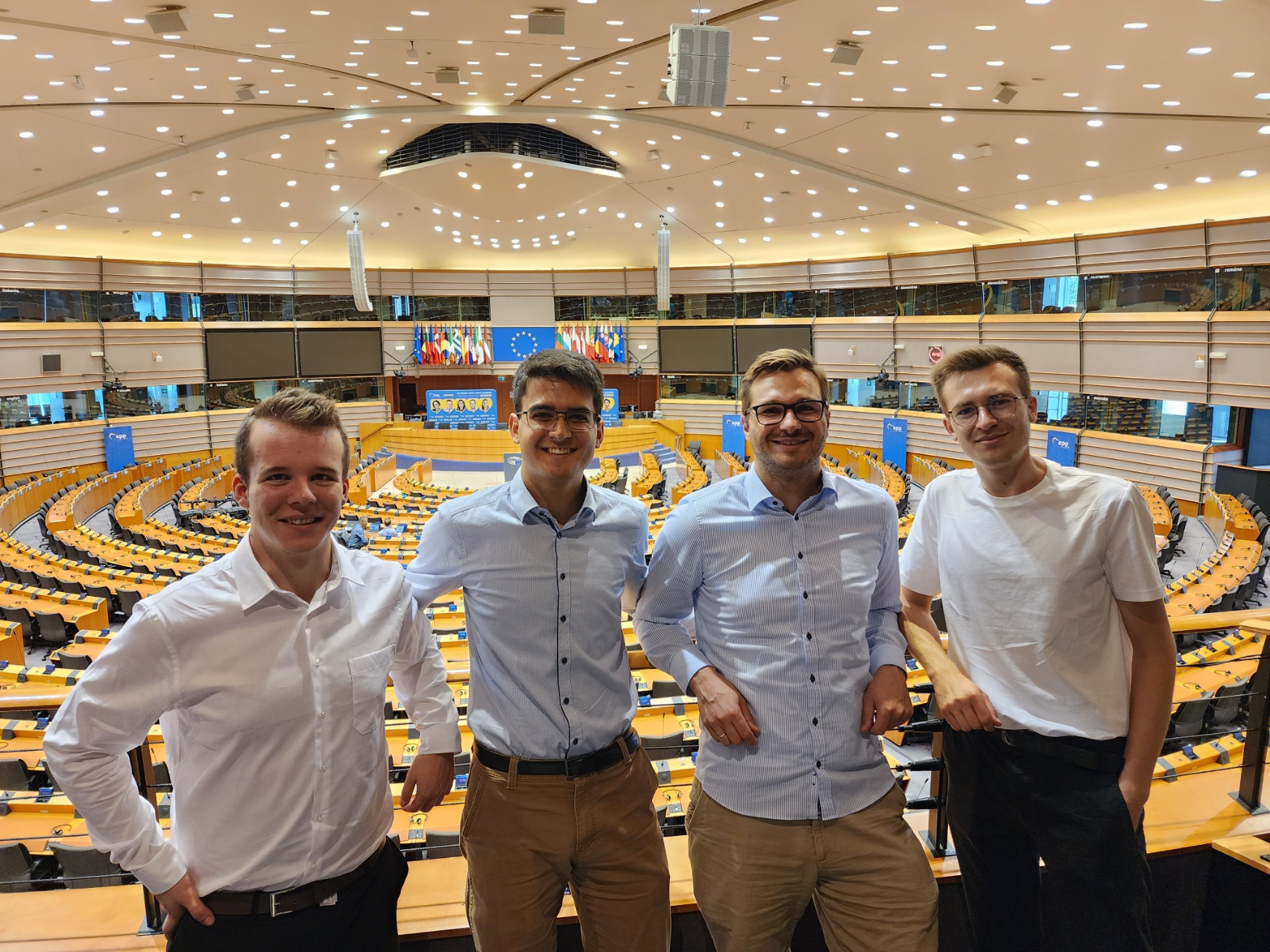European Future Technologies Summit 2023: A Deep Dive into AI and Digital Trust
The European Future Technologies Summit: a prestigious platform where young professionals play a key role in shaping the future of Europe. The summit contributes foresight knowledge, exploring, anticipating, and shaping the future to help build and use collective intelligence in a structured and systemic way
I had the immense privilege of attending the European Future Technologies Summit in Brussels, organized by EUREL, the Convention of National Associations of Electrical Engineers of Europe. I’m still buzzing with excitement from the incredible experience. Being the youngest participant was both an honor and a humbling experience, surrounded by brilliant minds and cutting-edge discussions and politics.

The EFTS aims to establish a Europe-wide technological-political network of young engineers with young politicians to facilitate exchange with EU parliamentarians and EU Commission officials and add value for stakeholders and maximum visibility of future technology in EU politics. To do so, it comprises of three events:
EUREL Young Engineers Seminar
The YES was organized in cooperation with the Konrad Adenauer Foundation Brussels. I had the privilege of attending workshops on AI and digitization as well as aspects of future energy and mobility with 30 young engineers from EUREL member associations. The expert-led workshops facilitated technology and policy exchange with the EU Commission and European Parliament (EP) politicians.
VDE Summer Reception with panel: “Digital Trust: the new frontier in the age of AI”
Held in collaboration with the Bavarian Representation to the European Union in Brussels, the VDE Summer Reception was a technology and policy-based event with impulses and discussions from top-class speakers followed by a panel on digital trust. This event enabled exchange with decision-makers from European institutions, industry, and science.
EUREL International Management Cup award ceremony
The IMC promotes entrepreneurial thinking among the next generation of engineers through an online strategic management business game.
Day 1: City Tour and European Parliament
The first day of the summit began with a burst of anticipation as I arrived in Brussels, ready to immerse myself in a world of technological innovation and digital trust. After a tiring five-hour train journey from Stuttgart to Brussels, I arrived in the city at 9:30am and had the pleasure of meeting up with two fellow participants, and together we embarked on an insightful journey through the city’s cultural riches. Before the formal proceedings even started, we had already experienced an enchanting exploration of Brussels, strolling through charming streets and soaking in the artistic but varied spirit of Brussels. This prelude to the event was a fitting introduction to the dynamic and diverse experiences that awaited us over the next three days.
Thankfully, our tour of Brussels wasn’t over since EUREL organized a guided tour of the city. It was only here that I realized how complicated and fragile the political situation is in Brussels, with multiple international institutions headquartered in Brussels. During the tour, we got to understand the different architectural styles in Brussels and their origins with how they blend into its complicated political history. However, Brussels complicated politics on a microscopic scale wasn’t the subject of this event. Instead, we were focused on the big picture of Europe and its regulations governing AI and the digital space.
After an incredible city tour by our local guide, we met up at the futuristically designed European Parliament and got another tour there.

During the visit to the European Parliament, our group had the opportunity to gain firsthand insight into the inner workings of European governance. The tour was a fascinating journey through the heart of the European Union’s legislative process. A particular highlight was the plenary chamber, where pivotal decisions are made, and a photo taken with the group serves as a tangible reminder of the significance of our visit. The experience underscored the importance of international cooperation and the role of European institutions in shaping the future of AI and digital trust.

After a long day, filled with lots of first impressions and lots of input, we retired to our rooms at the B&B Hotel in Brussels Midi.
Day 2: Workshops on AI & Digitization, VDE Summer Reception
After a good night’s rest, we started the second day of the summit with a keynote on the AI Trust Label and trust in the digital space by Dr. Sebastian Hallensleben, Head of Digitalization and AI at the VDE. As the day went on, various technical and political leaders shared their perspectives on the key themes. Dr. Hallensleben’s emphasis on the criticality of trust in the digital world was shared by Kai Zenner, Assistant MEP Axel Voss (EPP-Group), and Irina Orssich, Head of Sector AI Policy in the European Commission. Centered on the politics and regulations surrounding the AI Trust Label and EU AI Act, their presentations shed light on the evolving landscape of AI governance.
Shifting gears, Dr. Emmanuel Kahembwe, the CEO of VDE UK, challenged conventional notions of intelligence and intent within algorithms and machines, sparking a fresh perspective on how we define these concepts in the realm of artificial intelligence.
Armed with the knowledge of what to look for in trustworthy and ethical AI as well as a better understanding of artificial “intelligence,” Jessica Fritz, Digital Technologies and Services Manager at the VDE, ramped up the scariness factor with an AI-generated video on dealing with AI-enabled disinformation. With the best deep fake detection algorithms only having a success rate of 80% , combating fake bots, deepfakes, and AI-enhanced disinformation is no easy feat. A fact only made worse with the ease at which these videos can be mass-produced, requiring only a seven-minute video to convincingly make a person say anything you want.
Dr. Michael Rammensee, Managing Director AI Quality & Testing Hub, and Ferdinand Ferolli, Director Policy & Research of Identity Valley, followed by turning the spotlight onto digital responsibility and AI quality, stressing the need to ensure fairness in algorithms while upholding European values. Their talks let me appreciate how complicated and future-thinking laws must be to facilitate innovation in a human-centric way with guardrails to protect the public for the next couple of years. However, with such a fast-growing and hyped-up topic, the projected quinquennial meeting to review the laws governing AI in the EU is not enough. More efforts should be made to disallow bad actors like capitalistic mega corporations from taking advantage of the lack in governance to exploit and harm people using AI.
The workshops and seminars were then followed by the VDE Summer Reception with a panel of leading experts and politicians engaged around the ramifications of the technology. This panel highlighted the interdisciplinary approach that is needed in addition to harmonized standards across Europe to promote innovation with a focus on human well-being while implementing safeguards to ensure public safety.

After the fascinating panel discussion, we got to congratulate the winners of the International Management Cup, a strategic business simulation for students and young professionals of Electrical, Electronic and Information Technology Engineering.
Day 3: Workshops on Energy & Mobility
After the previous day’s heavy focus on AI and digitalization, we turned our focus to the sustainability, energy, and mobility sectors. Nora Dörr, VDE Project Manager for Innovation, kicked things off with a presentation on trend-setting decisions in the field of mobility, asking the vital question of “Is AI already good enough to make them?” With most of the R&D being invested in autonomous cars and their failures, it’s easy to overlook trains. Despite the $200 billion being poured into autonomous vehicle technology , a figure rapidly increasing with growing competition, autonomous cars remain unsafe for real-world situations with 392 reported crashes involving advanced driver-assistance systems in the US, according to the National Highway Traffic Safety Administration. Nora made me realize how AI has already been powerful enough to automate transportation for the past few years, but not in the way we think. As more regions invest in autonomous trains, their strengths have become more apparent and show us that they are the future and a worthwhile investment to optimize train operations, improve safety, and enhance passenger experiences. This point was driven home on my train ride back to Stuttgart, with my ICE running so late that I missed my connecting train, despite it also having a delay. In comparison to my experiences in Copenhagen, a city with metro lines running in punctual two-minute intervals, the German rail system remains in the past with regular delays, cancellations, and frustration.
However, not everything the DB does causes frustration. They remain a front-runner in the rail transportation system with all the ICE, IC, and EC trains running on clean, renewable energy since 2018. With more vehicles converting to electric-drive systems, the load on the power network remains on the rise. Alexander Nollau, Head of DKE Energy, demonstrated the power of data-driven solutions for sustainable energy and how the DKE is working towards a more sustainable future.
This feeling was shared by Dr. Jens Gayko, Managing Director of the VDE Standardization Council Industry 4.0 (SCI 4.0), who introduced us to the Digital Product Passport, a European Union initiative aimed at enhancing the traceability and sustainability of products. The Digital Product Passport concept revolves around creating a digital record or passport for physical products that contains comprehensive information about the product’s lifecycle, materials used, environmental impact, and other relevant data. This information can be accessed and shared digitally throughout the product’s journey, from manufacturing to disposal.
Conclusion
This immersive experience has deepened my understanding of AI ethics and technology’s profound impact on society. A huge thank you goes out to Fabienne Dezutter, EUREL Secretary General and VDE Political Affairs Officer, Markus B. Jaeger, VDE Global Head of Government and Political Affairs and EUREL Chairman Board, for the outstanding organization. EFTS 2023 was not just a summit; it was a catalyst for change, and I can’t wait to see the ripple effects in the years to come. As someone committed to improving racial and gender equity, diversity, and inclusion in the tech world, I am more motivated than ever to empower the next generation of AI Changemakers.

Join me in this journey towards a more inclusive, innovative, and trustworthy AI landscape. Together, we can shape the future of technology and ensure that it benefits everyone. Stay tuned for more updates and insights as we continue this exciting journey of discovery and transformation in the world of AI.